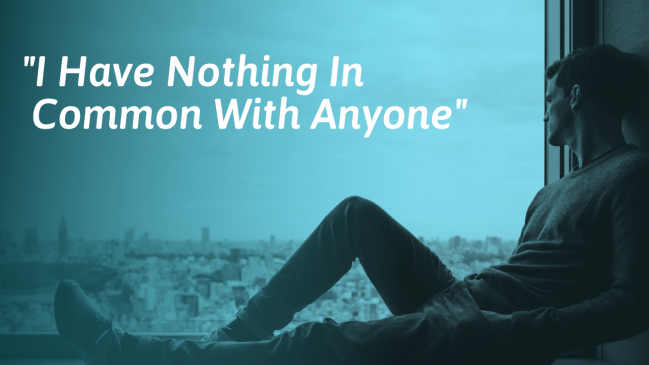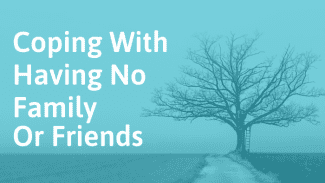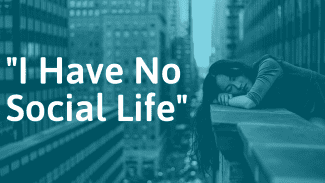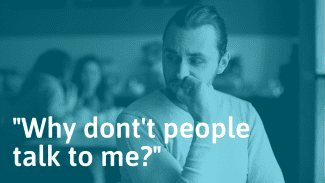It’s easiest to form relationships with people we have things in common with, so being different can feel like a bad thing.
You might feel different because of where you are from, what you look like, or what you believe in, or because you have an offbeat sense of humor, eclectic taste, or an unusual hobby.
While these things make you unique, they can also leave you feeling like an outsider at work, in your community, or even with your own friends and family.
Ironically, the belief that you have nothing in common with others could actually be part of the problem, leading you to make less of an effort to relate and connect to people who seem different from you.
In addition to providing practical tips to meet new like-minded people, this article will also outline ways to find things in common with people who you already know.
Most people feel like an outsider
In reality, you probably have more in common with people than you think.
For instance, in 2019, a study of over 10,000 Americans found that 58% of people feel like no one really understands them or knows them well, and most described that they sometimes or always feel lonely or left out. In this same study, 61% of people felt like most people don’t share their same interests or beliefs, suggesting that feeling like an “outsider” is actually very common.[2]
Know the difference between fitting in and belonging
You might even feel like in order to be accepted, you have to hide or change things about yourself to become more like other people, even if it comes at the expense of being yourself.
If what you want is to form closer relationships with people, pretending to be someone you aren’t can work against you.
As a renowned researcher and bestselling author Brene Brown says best, “belonging is being accepted for you, fitting in is being accepted for being like everyone else”, so just trying to “fit in” with the crowd can actually make you feel more like an outsider.[1]
Loneliness is common but possible to fix
Loneliness is a major pain point for people who feel like they have nothing in common with others. In recent years, loneliness has become so common that it is being described as an “epidemic” in America, affecting 52% of people in the US in 2019.
This is concerning because research tells us lonely people are less healthy, happy, and even live shorter lives than those with strong, close relationships. [2, 3, 4] While loneliness statistics paint a grim picture, there are also many reasons to be hopeful.
Compared to other epidemics, loneliness can be easily prevented by making an effort to meet people, open up, and deepen relationships. Because people of all ages (not just middle-aged people or older people) are feeling isolated, there are many options to meet like-minded people.
For example, there are apps that can help you find friends, romantic partners, and meetups in your community, and many groups have virtual options that allow you to participate from the comfort and safety of your own home. Because of the pandemic, many of these virtual communities are more active than ever before.
Are you unknowingly pushing people away?
People who feel lonely, left out, or misunderstood often develop defenses to protect themselves from the pain of being judged or rejected, not realizing how much these behaviors get in the way of forming close relationships with others.[5] If your goal is to better connect and relate to other people, there may be things you need to stop doing because they are making it hard for others to get to know you.
Some of the common defense mechanisms that could be pushing people away include:[5]
- Declining invitations to do things with a group when you are invited
- Becoming overly independent and not asking for help or input from others
- Sticking to surface level conversations and small talk to avoid letting people in
- Developing a persona that is different from who you really are
- Keeping your feelings, ideas, and opinions private
- Avoiding difficult conversations and allowing tension to build
- Overextending yourself to do things for other people at your own expense
- Being overly critical of other people and their differences
- Being overly critical of yourself and your differences
- Trying to emulate other people to gain acceptance
- Overidentifying with a role or your job to feel a sense of belonging or to distract from feelings of loneliness or emptiness
- Labeling yourself as “awkward”, “introverted” or as a “loner” and using these to make excuses for not trying to form relationships
What to do if you have nothing in common with people
Even with the current social restrictions during COVID-19, there are many ways to meet people who you have things in common with. It’s important not to rule out people in your existing network, especially since building upon existing relationships is often easier than building new ones from scratch.
1. Assume you have something in common with everyone
Unconsciously, people who feel like an outsider look for differences between themselves and others.
Confirmation bias is a well-understood psychological habit and involves finding “evidence” that supports our existing beliefs. You can reverse this bias by assuming that you have something in common with everyone, and looking for similarities instead of differences. This might be an interest or hobby, a show you both like, a country you’ve visited, or something deeper like a common value, religious belief, or personality trait. If you keep talking to someone for long enough, chances are, you will find something you have in common with them.
We also have a guide on how to find things in common with people.
2. Share something personal about yourself
Many people will try to hide the things about them that are personal but doing so keeps people from getting to know you, and can also make you feel more awkward or uncomfortable. These might include personal details about where you are from, hobbies you have, or music or art you like.
Even if you feel uncomfortable sharing about yourself because you think others won’t be interested, you might be surprised that others have similar interests and even if they don’t, they are still interested in learning more about you. You don’t have to overshare – even small details can make people feel more comfortable and open the door for more meaningful interactions.
3. Filter less of what you say and do
While it might seem like being perfect will win you friends, it might actually make you seem pretentious, which is more likely to intimidate people and trigger their own insecurities (everyone has them). Imperfections are what make you relatable to others, and also signal that it is safe for others to drop the “perfect” act, too.
This isn’t a suggestion to dumb yourself down or exaggerate your flaws, but rather to relax more around other people, filter less of what you say or do, and let more of your true self come through. Don’t be scared to make a corny “dad joke”, talk about your latest parenting fail, or speak up in a meeting when you missed something or don’t understand.
4. Follow your passions
One of the great things about technology is that it gives you an opportunity to connect with people with similar interests and ideas, no matter how random or uncommon they may be. There are meetups in most communities for people who are into hiking, yoga, coding, photography, and there are book clubs, support groups, and cooking classes, too. Many of these groups offer online meetings as well, making it easy, safe, and convenient to join. There are also several apps to help people make new friends, which level the playing field for people looking to expand their social circle.
5. See your differences as strengths
Most people could make a list of their greatest strengths and weaknesses, but don’t realize how connected these two lists are. For example, if being “type A” is one of your weaknesses, you might have “hardworking”, “detail-oriented”, or “organized” as a strength.
Even the things you don’t like about yourself (or assume others won’t like about you) could be a strength in the right situation. Try this exercise yourself by identifying ways your weaknesses could also be strengths.
The more you work on accepting yourself (including your “weaknesses”), the easier it becomes to imagine others will like and accept you, too and the less scary it feels to open up to others
6. Set a numeric goal to talk to more people
It’s not statistically possible that you have nothing in common with anyone, highlighting that this is probably an emotional thought rather than a rational one.
There are people in the world who you have a lot in common with, and statistically speaking, the more people you talk to, the more likely it is you will find them. Make it a numbers game by setting a numerical goal for yourself to interact with more people. Your goal could be to go on 5 dates this month (platonic or romantic), to ask a different coworker to lunch once a month, or to attend a weekly book club for at least 3 months.
7. Expand your interests by trying new activities
If you are having trouble identifying hobbies or activities you would find interesting or enjoyable, it may be time to expand your portfolio. It’s easy to get caught up in the daily hustle of work, raising kids, and ending each day on the couch with Netflix and a glass of wine, but this routine might be limiting your ability to meet people.
If this sounds like your life, consider branching out of your comfort zone and finding a hobby to make new friends. Consider signing up for a trial gym or yoga membership or trying out woodworking, pottery, or learning a new language at a community college.
8. Build self-awareness by taking a personality test
It can be hard to find people who you have a lot in common with when you don’t know enough about yourself. Consider taking a personality test like the Big Five to learn more about who you are, or use the Clifton Strengths Finder (not free) to learn about your natural gifts and abilities.
Self-discovery can be fun and helps you learn more about yourself, including how you relate to other people. Besides taking personality tests, you can also build self-awareness by identifying your communication style or using the conflict management style assessment, which can also help you identify barriers that could be getting in the way of connecting to others.
9. Find ways to cope with your inner critic
Like many, you probably have an inner critic that gets loud during times when you feel insecure, have made a mistake, or are worried about something that might happen in the future. While the inner critic can help you solve problems, make decisions, and plan things out, it can also get in the way of feeling confident and derail efforts to connect to others. When this happens, work on quieting the critic by pulling your attention back to the here-and-now instead of “participating” in the negative conversation in your head.
Learn more strategies to refocus attention and get out of your head in our article on how to be less self-conscious.
10. Talk to people who are different from you
Being open-minded widens your circle, increasing opportunities to form close relationships with others, including people you don’t expect to have anything in common with.
You might be surprised to find how much you have in common with someone who is seemingly very different from you. Don’t end a conversation with someone when they share an opinion or belief that differs from yours. Instead, be curious, ask questions, and seek to learn more about their ideas.
If you can work on being more open and accepting of people with different backgrounds, beliefs, and interests, you can help another person struggling with the same issues you are.
Final thoughts
By using the strategies and steps above, it is possible to find more people who you have things in common with and build deeper, closer relationships with them. Because so many people are looking for the same thing, your search might be easier than you think it will be. Try to get started by setting small, attainable goals to meet and talk to more people, and work on opening up to people more.
The more consistent you can be, the more likely it is that you will find people who you have a lot in common with, sometimes in unexpected places.





